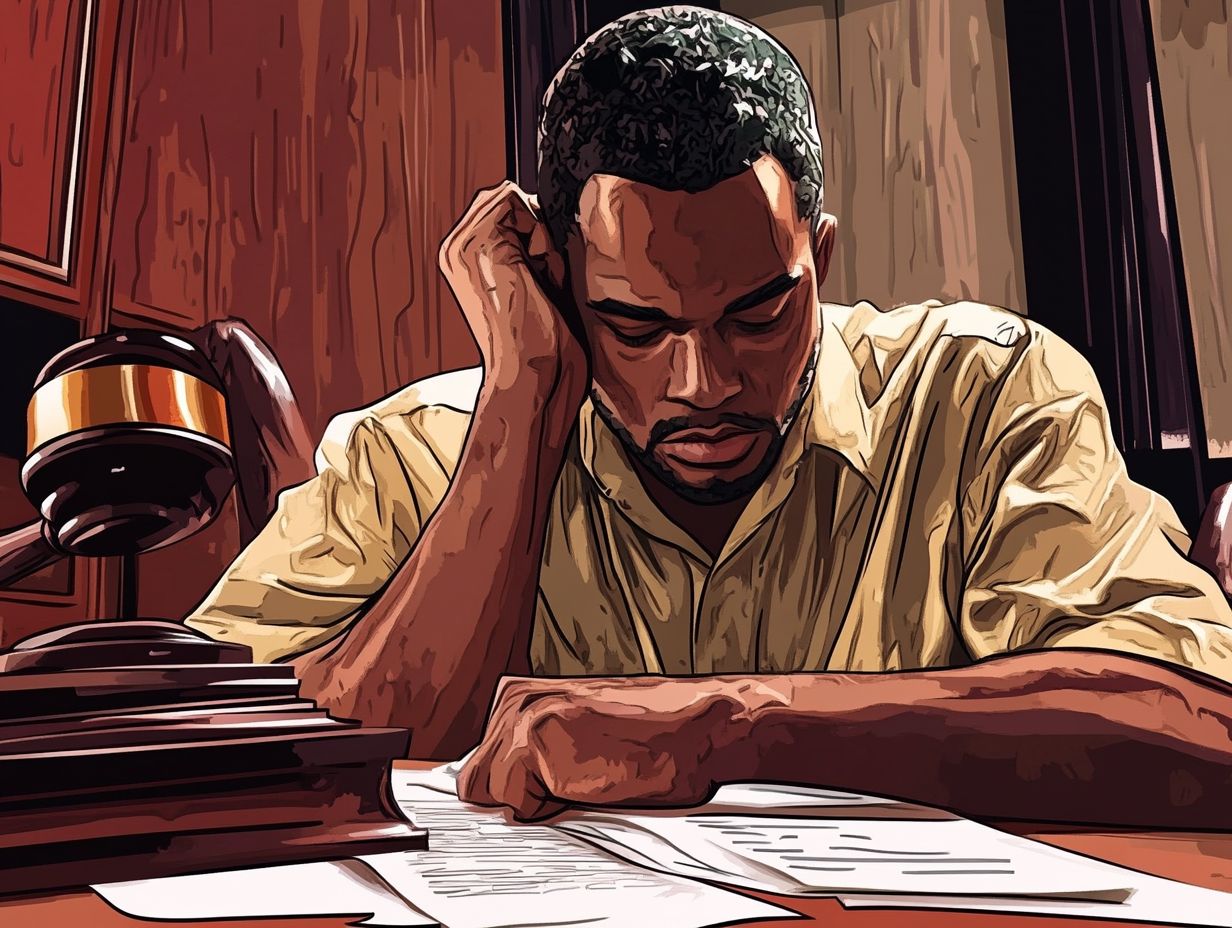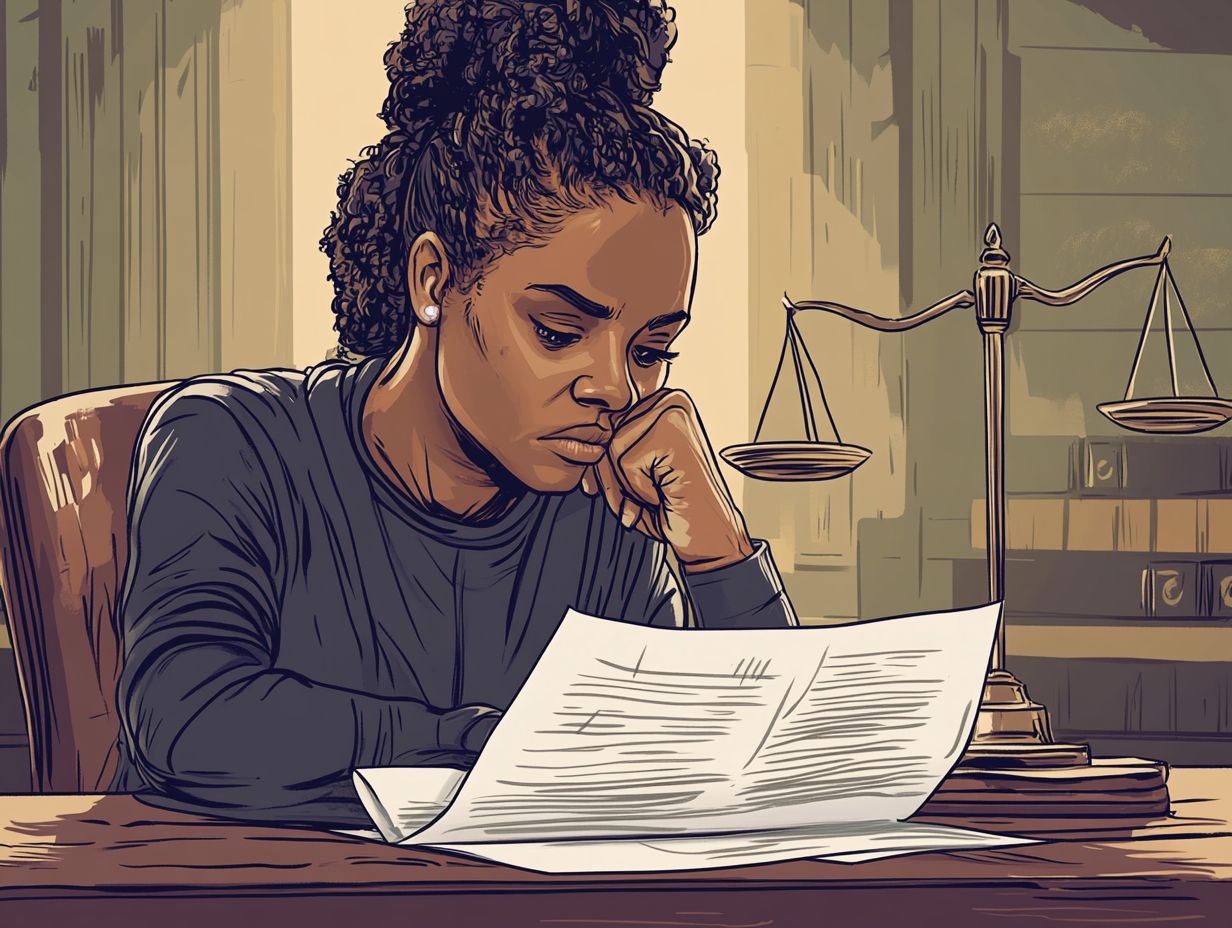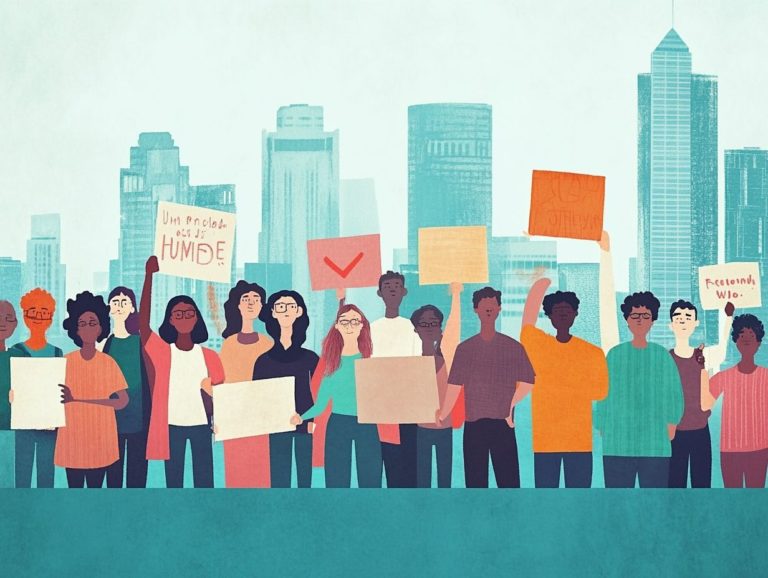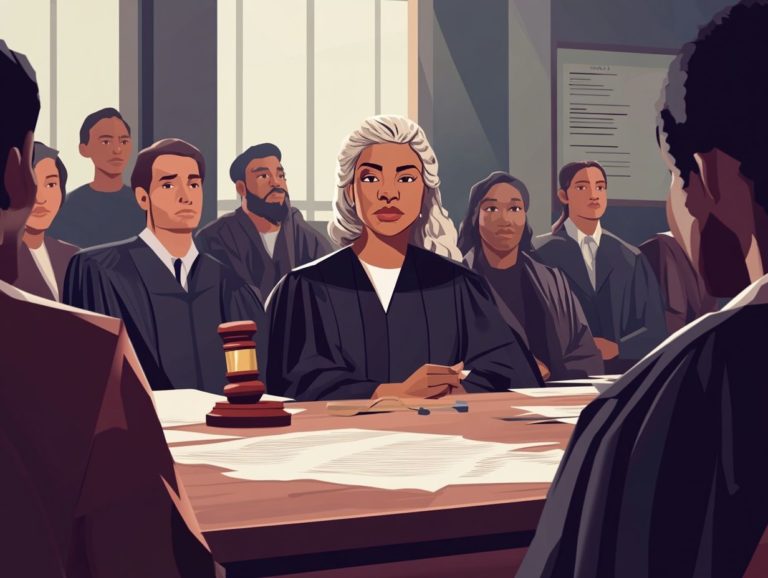Your Responsibilities as an Accused Person
Navigating the legal system can feel like an uphill battle, especially when you’re faced with accusations. Understanding your rights and responsibilities as someone accused is vital for ensuring that the process remains fair.
This article explores the essential legal protections available to you and emphasizes the importance of working closely with your lawyer. It also discusses the potential consequences of neglecting your responsibilities and provides practical tips for effective communication and proactive engagement in your case.
Equip yourself with the knowledge you need to tackle this challenge head-on!
Contents
- Key Takeaways:
- Understanding Your Rights as an Accused Person
- Roles and Responsibilities of the Accused
- Possible Consequences of Not Fulfilling Responsibilities
- Tips for Fulfilling Your Responsibilities
- Frequently Asked Questions
- What are my responsibilities as an accused person?
- Do I have the right to remain silent as an accused person?
- Am I responsible for finding my own legal representation?
- What happens if I fail to fulfill my responsibilities as an accused person?
- Can I be found guilty if I do not have a lawyer?
- What should I do if I have any questions about my responsibilities as an accused person?
Key Takeaways:
- You have rights that ensure due process.
- Cooperate with your lawyer to prepare your case.
- Neglecting your responsibilities can lead to serious consequences.

As an accused person, it is important to understand your rights and legal protections to ensure due process is followed. Cooperating with your legal counsel and preparing for court proceedings are key responsibilities that can impact the outcome of your case. Failure to fulfill your responsibilities can result in negative consequences, including delays in legal proceedings and potential additional penalties.
Understanding Your Rights as an Accused Person
Understanding your rights as an accused person is essential for a fair trial within the criminal justice system. You need to recognize the procedural rights guaranteed by legal frameworks in jurisdictions like the US, Europe, and Latin America. Access to information and legal assistance is crucial for preparing a solid defense.
Landmark court cases like Powell v. Alabama and Gideon v. Wainwright highlight the significance of these rights. The idea that both sides in a trial have the same chance to present their case ensures you have equal opportunities as the prosecution.
It s also important to know your rights related to criminal responsibility, the mental state or intent when committing a crime, and legal justifications like self-defense and necessity when facing serious allegations.
Legal Protections and Due Process
Legal protections and due process are fundamental rights you have if accused of a crime. They ensure that your trial unfolds fairly and aligns with established laws and judicial precedents.
These rules protect you from unfair treatment and maintain the integrity of the legal system. The criminal justice system is designed to guarantee access to competent legal defense.
This commitment is highlighted by the Model Penal Code, which lays out standardized principles of criminal law.
Landmark Supreme Court decisions like Gideon v. Wainwright and Powell v. Alabama have fortified these protections, ensuring that even those without sufficient financial means can secure legal representation.
When violations of due process occur whether through inadequate legal counsel or a failure to provide a fair hearing this can seriously affect the outcome of your trial, so take it seriously!
Roles and Responsibilities of the Accused
The roles and responsibilities of the accused in a criminal trial are complex and varied. Active engagement with the legal system is crucial for establishing a strong defense and ensuring a fair opportunity to contest the charges against you.
Cooperating with Legal Counsel

Cooperating with your lawyer is an essential responsibility for anyone facing charges. Your communication with your lawyer can significantly influence the fairness of your trial and the development of a solid defense.
To cultivate a fruitful relationship, prioritize sharing all relevant information, no matter how trivial it may seem. Even the smallest details can carry considerable weight in your case.
Participating in open discussions about potential strategies is equally important. This collaboration allows both you and your lawyer to explore options that could lead to a favorable outcome.
Understanding the trial process is crucial as well. By familiarizing yourself with the various stages and potential challenges, you can better prepare for what lies ahead.
This level of cooperation not only strengthens your defense but also guarantees access to vital information, ultimately contributing to your pursuit of a fair trial.
Preparing for Court Proceedings
Preparing for court proceedings is essential for you as the accused. It allows you to present a well-structured defense while understanding the legal justifications relevant to your actions.
To secure the best possible outcome, it s vital to carefully collect evidence, including documents, witness statements, and any relevant materials that could support your argument. A clear understanding of the specific charges and potential penalties will enhance your strategic approach.
It’s also important to consider your mental state. Mens rea, or the mental state behind your actions, is key in legal cases. By familiarizing yourself with the judicial process, you ll be better equipped to navigate its complexities, ensuring a fair trial and reinforcing your position in court.
Possible Consequences of Not Fulfilling Responsibilities
Neglecting your responsibilities as an accused individual can lead to significant repercussions, affecting not just the legal proceedings but also personal outcomes within the criminal justice system.
Impact on Legal Proceedings
The impact on legal proceedings can be significant when you fail to fulfill your responsibilities. This oversight can lead to unfair trials and unjust outcomes. Such shortcomings hinder your defense and skew the jury’s perception, ultimately altering the course of justice.
Take, for example, the high-profile case of State v. Johnson. The defendant’s lack of cooperation with counsel resulted in poorly formulated legal strategies that overlooked key evidential weaknesses. This omission reduced the chances of exoneration and led to damaging assumptions during jury deliberation.
Similarly, in Smith v. State, inadequate preparation led to missed opportunities for crucial evidentiary presentations. This created an environment where the presumption of innocence began to erode.
These cases highlight the critical importance of your active engagement in your defense to ensure a fair trial process.
Additional Penalties

Additional penalties may be imposed on you if you fail to meet your legal responsibilities. This can intensify your legal troubles and complicate your defense.
Such consequences can include substantial fines that strain your financial resources, longer prison sentences, and adverse effects on any future appeals you might file.
These penalties can create serious challenges for your future. By reinforcing the importance of upholding your responsibilities, the legal framework aims to promote accountability, ensuring that you recognize the weight your decisions carry as you navigate your case effectively.
Tips for Fulfilling Your Responsibilities
Fulfilling your responsibilities as an accused individual is crucial for successfully navigating the legal system. Here are several insightful tips to enhance your communication and foster proactive engagement with your legal counsel:
Effective Communication with Legal Counsel
Effective communication with your legal counsel is paramount. To nurture this vital relationship, it’s essential for you to articulate your concerns and circumstances clearly and concisely, presenting all relevant facts without holding back.
This transparency allows your attorney to grasp the full context of your case, paving the way for a more robust legal strategy. Being honest about any potential issues or uncertainties can significantly shape the overall legal approach and enhance the chances of achieving a fair trial outcome.
By fostering open dialogue and mutual trust, you can actively engage in protecting your legal rights and contribute to a thorough and effective defense.
Take immediate steps towards engaging with your legal counsel to ensure you are well-prepared for your case.
Being Proactive in Your Case
Being proactive is essential in your case. Taking initiative can greatly influence the outcome of legal proceedings.
It s important to understand the details of your legal rights, giving you power during challenging times. Staying informed about court processes helps you know what to expect and enhances your ability to respond effectively.
Engaging actively with your legal team is crucial. Open communication fosters collaboration, leading to strategic advantages.
By taking these proactive steps, you fulfill your responsibilities and boost your chances of navigating the legal system successfully. This ultimately supports your quest for a fair trial.
Frequently Asked Questions

What are my responsibilities as an accused person?
You have certain responsibilities during the legal process. Attend all court hearings, cooperate with your lawyer, and follow any bail conditions.
Do I have the right to remain silent as an accused person?
Yes, you have the right to remain silent and not incriminate yourself. It s important to exercise this right and consult your lawyer before speaking to police or in court.
Am I responsible for finding my own legal representation?
Yes, it s your responsibility to find and hire your own lawyer. If you can t afford one, the court may appoint a lawyer for you.
What happens if I fail to fulfill my responsibilities as an accused person?
If you fail to fulfill your responsibilities, such as not attending court hearings, you could face serious consequences like arrest warrants or bail revocation.
Can I be found guilty if I do not have a lawyer?
Yes, you can be found guilty without a lawyer. Consulting with a lawyer is crucial to understand your rights and the legal process.
What should I do if I have any questions about my responsibilities as an accused person?
If you have questions, consult your lawyer. They can provide the necessary guidance for fulfilling your responsibilities during the legal process.






